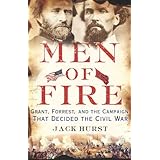
Average Reviews:

(More customer reviews)In Men of Fire, Jack Hurst, a Nashville-based author and former journalist who has written for the Chicago Tribune, the Philadelphia Inquirer, and The Tennessean, has penned a comprehensive, graphic narrative of a Civil War campaign that split the Confederacy in two.
Some 75 miles northwest of Nashville, on the Cumberland River near the hamlet of Dover, Tennessee, was Fort Donelson, and 12 miles farther west, on the Tennessee River, was Fort Henry.
In February,1862, Union forces commanded by Brigadier Gen. Ulysses S. Grant (army) and Flag-Officer Andrew Hull Foote (navy) led an expedition to capture these Confederate forts.
Marking the first major Union victories of the Civil War, their capture opened two strategic waterways that pointed like twin daggers at the heart of the Confederacy.
Hurst focuses on Ulysses S. Grant (1822-1885), born in Point Pleasant, Ohio, and Nathan Bedford Forrest (1821-1877), born in Chapel Hill, Tennessee. Although different in many ways, these men were alike in one important respect: both were fighters. These "men of fire" detested defensive warfare; they aggressively sought to hit the enemy and hit him hard.
First to be attacked was the more vulnerable Fort Henry, constructed injudiciously on shallow land often flooded by the Tennessee. Pummeled by revolutionary new ironclads led by Foote, the garrison soon evacuated the fort and fled to the more secure Fort Donelson.
Pursuing the Southern troops on a balmy, spring-like day, Union troops blithely discarded their overcoats and blankets, and left behind their tents. The next day an arctic blast hit the area, dropping the temperature to 15 degrees. During the night, many soldiers were frozen to the ground where they fitfully tried to sleep.
A horrendous battle for the more heavily fortified bastion on the Cumberland, gateway to Clarksville and Nashville, ensued on February 15.
After being invested by Grant's forces, Gen. Gideon Pillow, the de facto commander of Fort Donelson, made a desperate, and apparently successful, attempt to break out and retreat to Nashville. Then, for some inexplicable reason, Pillow made a horrendous blunder: he ordered his troops back into the rifle pits and fort.
Disgusted by such a cowardly retreat, Forrest determined to lead his cavalry in a second attempt at a breakout. He succeeded, and led his men to Nashville.
Pillow also escaped from the fort via steamship, leaving the fort's surrender to Gen. Simon Buckner. "The best estimates," writes Hurst, "are that from 16,500 to 17,500 Confederates [were surrendered]," the largest capitulation that had ever made on the continent.
Hurst calls this "the campaign that decided the Civil War." Such a claim, after only ten months into the war and with more than three years remaining, is exaggerated, for many blood clashes remained: in the Western theater, the battles of Shiloh, Chickamauga, Chattanooga, Stones River (Murfreesboro), Vicksburg, Atlanta, Franklin, and Nashville; and in the Eastern theater, the battles of Antietam, Fredericksburg, Chancellorsville, Gettysburg, the Wilderness, and Cold Harbor.
The true villain of Hurst's chronicle is Grant's immediate "superior," Henry Halleck, who commanded the Union's Western armies. Secretary of War Edwin Stanton branded him a man "destitute of principle" and "the most bare-faced villain in America."
Hurst points out that the Machiavellian Halleck, seeking to have Grant replaced because of his past history of alcoholism, "now proceeded to show just how utterly unfair, mean-spirited, and maliciously dishonest he could be." He did everything in his power to slander Grant's reputation.
Grant's victory, however, dramatically infused his shaky reputation with an aura of power, and he was promoted to Major General. When asked to relieve Grant of command, Lincoln replied, "I can't spare that man. He fights."
Civil War buffs know the rest of the story. Grant went on to preside over the surrender of two more huge Confederate armies: at Vicksburg and at Appomattox Court House, and to become President of the United States. Nathan Bedford Forrest, a former owner and seller of slaves, became a prime organizer of the Ku Klux Klan.
Having done an admirable job of research, Jack Hurst presents detailed specifics about intricate troop movements, paints fascinating portraits of the principals involved, and presents an unforgettable impression of the grim realities of battle. Men of Fire is a captivating account of the first significant Union victory of the Civil War--a book that seems destined to become a classic.
ABOUT THE AUTHOR: Jack Hurst is a former journalist who has written for newspapers including the Chicago Tribune, the Philadelphia Inquirer, and The [Nashville] Tennessean. He is the author of Nathan Bedford Forrest: A Biography. A descendant of both Union and Confederate military officers, he currently lives with his wife outside of Nashville, Tennessee.
Click Here to see more reviews about: Men of Fire: Grant, Forrest, and the Campaign That Decided the Civil War
